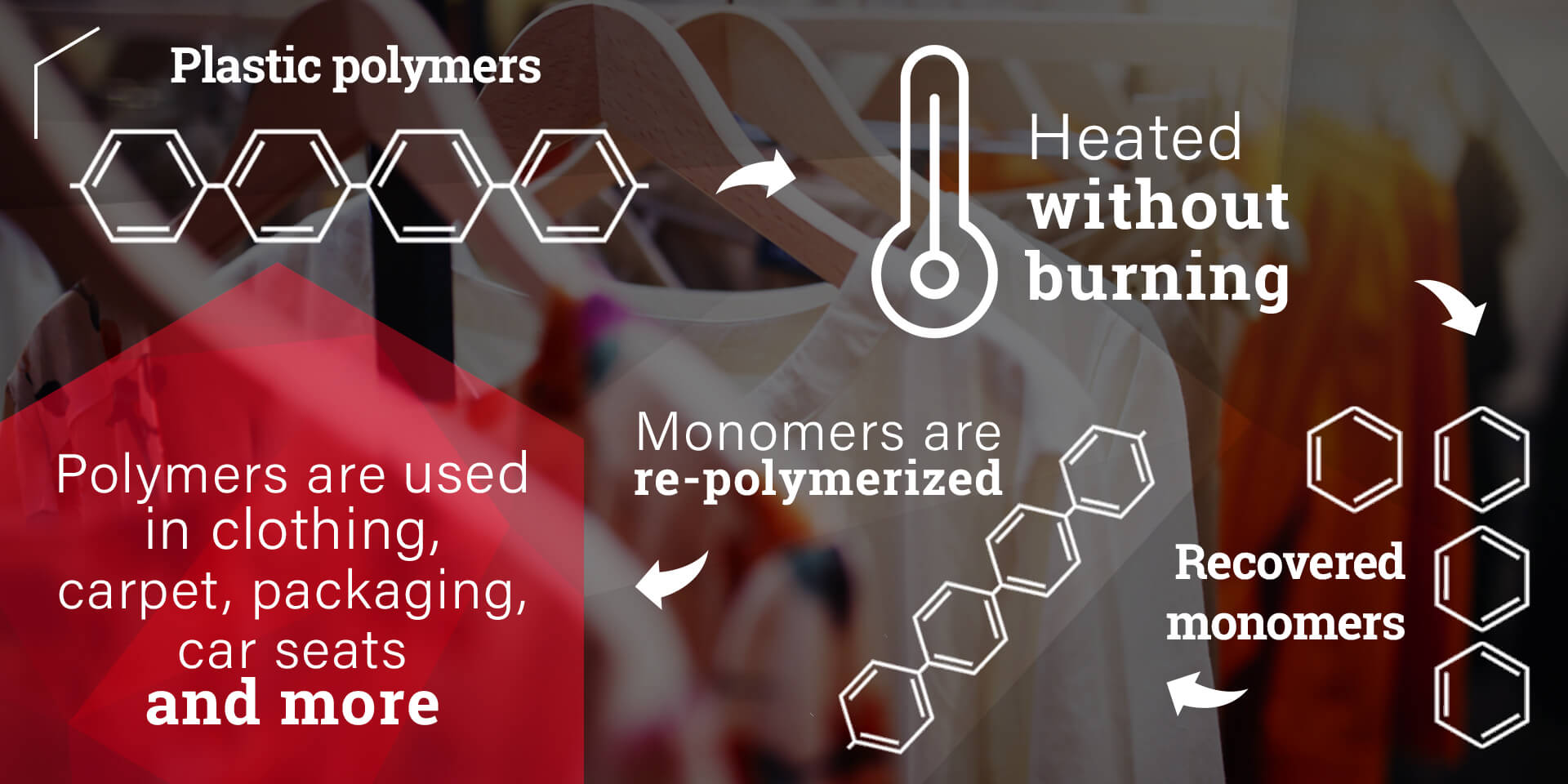What Is Advanced Recycling?
Advanced recycling encompasses any technology that converts plastics into a purified form or a feedstock that can be used in the production of new polymers, monomers, intermediates, or other materials. While mechanical recycling uses physical processes such as grinding, washing, separating, and compounding in which polymers remain intact, advanced recycling typically alters the chemical structure of plastics, by methods such as dissolving with chemicals or using heat to break them down into original components. Advanced recycling produces materials that are indistinguishable from virgin plastic so they can be used to make a wide range of new products.
Here’s one way plastics can be chemically recycled in an oxygen-free environment:
Polymer: a large molecule made up of monomers
Monomer: a molecule that can be bonded to others to create a polymer
Re-polymerization: the process in which recycled monomers are bonded to create new polymers
Purification
Purification uses solvents to separate polymers from additives, colorants, odors, and other contaminants. The polymers, such as polypropylene, remain intact and can be used for new plastic products. Purification is most successful when processing single streams of plastic waste.
Depolymerization
Depolymerization uses biological, chemical, thermal, or in some cases a combination of these processes to break plastics down into their basic building blocks, or monomers such as ethylene. These monomers can then be used as raw materials for new plastic products. This technology is best used for similar types of plastic as opposed to mixed plastic waste.
Conversion
Conversion uses heat to return plastics to their most basic building blocks, such as ethane, so they can be used as raw materials for new plastic products or fuel. These types of advanced recycling can process more complex mixtures of plastic and yield the same high-quality recycled polymers.
Advanced Recycling in Action
Agilyx an alternative energy company, recycles polystyrene (which most people know as Styrofoam™) into high-value petrochemicals. Agilyx’s polystyrene recycling process creates like-new materials while generating fewer greenhouse gases than manufacturing does.
Eastman and their polyester renewal technology takes plastics, such as soft drink bottles, carpet, or even polyester based clothing, and breaks them down back to their basic monomers. These monomers are then sent through a polymerization process to make finished goods.
Purecycle is using advanced recycling technologies to separate color, odor, and contaminates from #5 plastic waste streams and transform the material into virgin-like polypropylene. Polypropylene has an extremely low reclamation rate, and Purecycle’s process creates an opportunity to fully close the loop for this versatile and robust material.
LyondellBasell is one of the largest plastics, chemicals, and refining companies in the world. Using their MoReTec technology, they are converting plastic waste into feedstocks for virgin polyethylene and polypropylene. The new resin can be used in a wide range of applications including food packaging and medical supplies.
Sources & Resources:
- https://www.wastedive.com/press-release/20180424-agilyx-opens-the-worlds-first-commercial-waste-polystyrene-to-styrene-oil/%20%20%20
- https://shawinc.com/Newsroom/Press-Releases/Shaw-Carpet-Recycling-Facility-Successfully-Proces/
- http://www.recyclingtoday.com/article/petg-medical-packaging-recycling/
- https://www.patagonia.com/blog/2009/03/closing-the-loop-a-report-on-patagonias-common-threads-garment-recycling-program/
- https://www.lyondellbasell.com/en/sustainability/ending-plastic-waste/
- https://www.eastman.com/Company/Circular-Economy/Solutions/Pages/Mechanical-Molecular.aspx
- https://www.purecycle.com/

